By Kelvin Cedeno
Television spin-offs function much in the same way film sequels do: they're created in response to enthusiastic audience reception towards the original. Like sequels, spin-offs tend to be hit and miss, more often than not the latter. With "Happy Days" being such a success and containing a wide variety of supporting characters, it comes as no surprise that a number of spin-offs were produced. Of these, the one to garner the most fame was "Laverne & Shirley".
The two title characters made their first "Happy Days" appearance in the third season episode "A Date with Fonzie." Whether it was due to strong viewer response or creator Garry Marshall's enthusiasm to give his younger sister a nostalgic sitcom, Laverne and Shirley garnered their own show a mere two months after their debut.
"Laverne & Shirley" follows the hijinks of Laverne DeFazio (Penny Marshall) and Shirley Feeney (Cindy Williams), two bottle cappers living together in late-1950s Milwaukee. In true "Odd Couple" fashion, both women present radically different ends of the personality spectrum. Laverne is a rough-and-tumble tomboy who isn't above using brute force to get her way. Shirley, on the other hand, is a prissy worrywart who tries to avoid any sort of confrontation or problem, not an easy feat with a roommate like Laverne. The one thing both women have in common is an uncontrollable affinity for men, a trait which often leads to trouble.
Their landlord Edna Babish (Betty Garrett) is a friendly, down-to-earth person who also happens to be dating Laverne's hot-tempered father Frank (Phil Foster). Shirley casually dates a singer/dancer named Carmine Ragusa (Eddie Mekka), otherwise known as "The Big Ragoo" (spelled differently from the pasta sauce). Also living in the apartment building are two obnoxious, offbeat friends who have a knack for showing up at the most inopportune time: Lenny (Michael McKean) and Squiggy (David L. Lander).
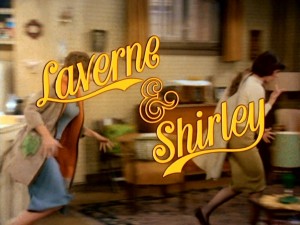
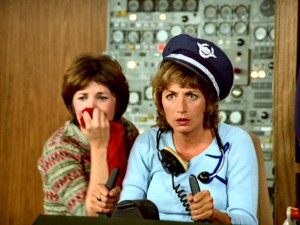
While "Laverne & Shirley" tonally is similar to its older sibling "Happy Days", it offers a different flavor. When comparing the two, the first thing one notices is how less nostalgic this show is. Despite being set in the late 50s/early 60s, there's very little to signify what the time period is. That's not to say the show is anachronistic, but it doesn't seem to celebrate and revel in oldies pop culture the way "Happy Days" did. The other notable difference is in the focus of comedy. "Laverne & Shirley" relies more on slapstick and tomfoolery and is decidedly more over-the-top. This hampers the show a bit as the outrageousness comes so often that it loses its punch.
Another issue stems from the way the storylines play out. Most of the time, one can easily see where the plot points are coming and what the gag payoffs will be. While part of this is understandably due to so many modern sitcoms stealing formulas from this and other classic shows, the writers telegraph what's coming too early. Sometimes this is effective when the humor is meant to come from the anticipation of a joke rather than the actual arrival of it. Usually it isn't, however. The writers also have trouble blending comedy and drama seamlessly. The more emotional scenes of the series feel rather forced and preachy. Though comedy is able to go above and beyond what realistically happens in real life, drama doesn't have the same luxury. In order to be convincing, scenes with weight to them need to be more natural and less stagy, and this is something the show struggles with.
"Laverne & Shirley" succeeds in one key aspect that makes the show enjoyable and memorable regardless of anything else, and that's in its performances. As the two title characters, Penny Marshall and Cindy Williams have much to bear on their shoulders. They're in virtually every scene, so there can't be a case of bland lead characters surrounded by colorful supporting ones (a tactic frequently used in films). Both actresses rise to the challenge, though. A scene that may not work so well on paper is sold simply by the deliveries and mannerisms Marshall and Williams bring. While the two grew competitive as the show progressed (causing Williams to leave), it can't be denied that they had great chemistry onscreen. The dynamic between them elevates the show and is the chief reason why it endured so long in the public's eye.
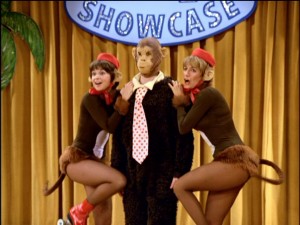
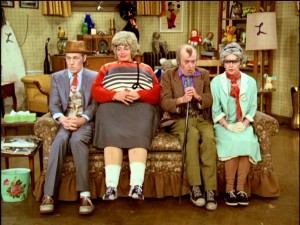
After the sitcom's first season was released to DVD, nearly three years passed before the second season was finally released. Undoubtedly this is because the first season didn't sell as well as distributor Paramount may have liked.
Either that set eventually reached the desired numbers or the fan outcry was too great, for seven months after the second set comes this release of The Third Season. Like the previous two, there's a notice on the rear cover art stating that some music has been changed for DVD and that some episodes may be further edited. It's unfortunate that this and "Happy Days" must be presented this way, but the music rights probably would be cost-prohibitive.
Some instrumentals that bridge scenes together sound noticeably clearer than others, indicating perhaps that they are new for DVD. Two back-to-back episodes ("The Second Almost Annual Shotz Talent Show" and "The Dentist") have noticeably shorter running times. The former heavily relies on music to begin with, but if any edits were made, they were done skillfully. All of Carmine's musical numbers throughout the season appear to be included, so whatever cuts took place were probably minimal at best.
Episode summaries of the four-disc set's episodes follow. A star ( ) indicates the ten most memorable episodes of the season.
) indicates the ten most memorable episodes of the season.
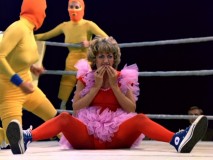
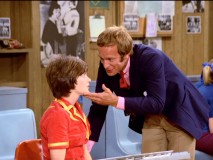
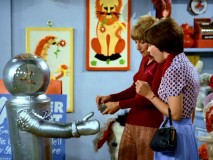
Disc 1
 1. Airport '59 (25:04) (Originally aired September 20, 1977)
1. Airport '59 (25:04) (Originally aired September 20, 1977)
Laverne and Shirley go on a flight, but when the pilot is rendered unconscious, they're forced to fly the plane themselves.
2. Tag Team Wrestling (25:06) (Originally aired September 27, 1977)
Shirley holds a benefit wrestling match, but Laverne is horrified to discover that her opponents are two women she had insulted earlier that morning.
3. The Pact (25:11) (Originally aired October 4, 1977)
A suave ladies' man (Dale Robinette) asks Shirley out on a date. Things get complicated when he asks Laverne out the next day.
 4. The Robot Lawsuit (24:51) (Originally aired October 25, 1977)
4. The Robot Lawsuit (24:51) (Originally aired October 25, 1977)
Laverne is attacked by a toy robot in a store. After suffering injuries, she's persuaded by a seedy attorney to sue the store.
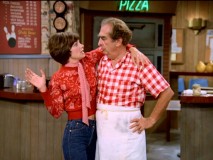
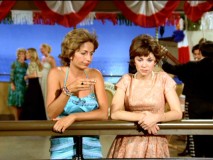

5. Laverne's Arranged Marriage (24:26) (Originally aired November 1, 1977)
Frank arranges a marriage between Laverne and a wealthy cheese manufacturer (Johnny Desmond) who also happens to be a mobster.
6. An Affair to Forget (Part 1) (25:08) (Originally aired November 8, 1977)
Laverne and Shirley plan on going on a vacation cruise. When they're fifty dollars short, Carmine hooks them up with a part-time job in a children's shoe store.
Disc 2
7. An Affair to Forget (Part 2) (25:11) (Originally aired November 15, 1977)
Lenny and Squiggy stow away on Laverne and Shirley's cruise ship. Shirley is attracted to the captain (Philip Clark) but feels he's rushing the relationship.
 8. Laverne and Shirley Meet Fabian (25:06) (Originally aired November 22, 1977)
8. Laverne and Shirley Meet Fabian (25:06) (Originally aired November 22, 1977)
After making a bet with Rosie (Carol Ita White), Laverne and Shirley desperately try to get their picture taken with famed singer Fabian, who happens to be in town for a concert.

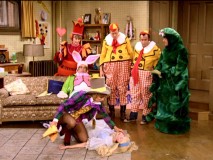
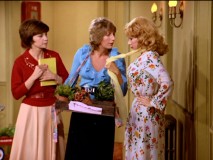
9. The Stakeout (24:56) (Originally aired November 29, 1977)
Laverne and Shirley offer their apartment to two F.B.I. agents for a stakeout. Things take a turn when they realize the men are there to catch Carmine in the act of counterfeiting.
 10. Shirley's Operation (25:09) (Originally aired December 6, 1977)
10. Shirley's Operation (25:09) (Originally aired December 6, 1977)
The gang helps Carmine put on a stage show of Alice in Wonderland.
During rehearsals, Shirley passes out and finds her appendix needs to be removed immediately.
11. Take My Plants, Please (25:05) (Originally aired December 13, 1977)
When the girls are temporarily laid off from work, Shirley convinces Laverne to start a plant-selling business.
 12. New Years Eve 1960 (24:56) (Originally aired December 27, 1977)
12. New Years Eve 1960 (24:56) (Originally aired December 27, 1977)
Shirley hosts a New Year's Eve party but is soon stricken with a cold. Laverne's date for the night abandons her when he runs into his ex-wife at the party.

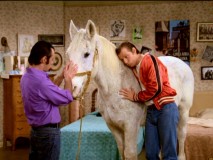
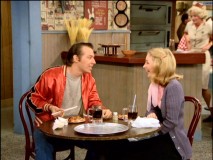
Disc 3
13. The Mortician (25:09) (Originally aired January 10, 1978)
Laverne stalks a man she finds attractive and finds that he's a mortician. Struggling for a reason as to why she's at the morgue, she tells him that Shirley is dying.
14. The Horse Show (25:08) (Originally aired January 17, 1978)
Shirley saves a childhood horse of hers from going to the glue factory. Much to everyone's chagrin, she keeps the horse inside the apartment.
 15. The Slow Child (25:03) (Originally aired January 24, 1978)
15. The Slow Child (25:03) (Originally aired January 24, 1978)
Edna's mentally handicapped daughter Amy (Linda Gillin) comes to visit. She forms a bond with Lenny, but Edna is worried that he's out to take advantage of Amy.
 16. The Second Almost Annual Shotz Talent Show (23:51) (Originally aired January 31, 1978)
16. The Second Almost Annual Shotz Talent Show (23:51) (Originally aired January 31, 1978)
Mr. Shotz (Harry Shearer) appoints Laverne and Shirley as directors of a talent show on one condition: that they find a spot in the show for his talent-less nephew (Ed Greenberg).

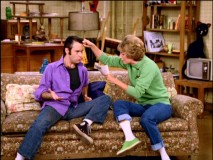
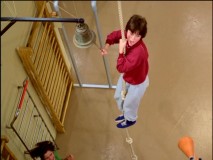
17. The Dentist (23:29) (Originally aired February 7, 1978)
Laverne chips her tooth, so Shirley recommends that her cousin Mikey (Bob McClurg) fix it.
Unfortunately, Mikey isn't out of dental school, yet, and has failed his exam several times.
18. Bus Stop (24:47) (Originally aired February 14, 1978)
Laverne and Shirley travel to another city to meet up with two medical students. The girls find out that both men are sleazy and end up stranded at a bus stop.
Disc 4
19. The Driving Test (25:05) (Originally aired February 21, 1978)
Squiggy needs to pass the written portion of his driver's test or else he'll lose his truck-driving job. Laverne and Shirley tutor him, but grow increasingly frustrated.
20. The Obstacle Course (25:07) (Originally aired February 28, 1978)
Wanting to join Laverne in the Ladies' Auxiliary Milwaukee Police, Shirley has to pass an obstacle course. Laverne struggles to train her.
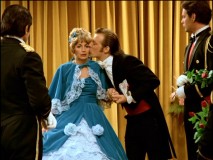

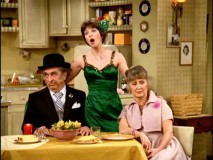
 21. Debutante Ball (25:05) (Originally aired May 9, 1978)
21. Debutante Ball (25:05) (Originally aired May 9, 1978)
Lenny turns out to be 89th in line for the Polish throne, so he asks Laverne to escort him to a debutante ball. The two don't blend in as well as they'd hope, though.
22. 2001: A Comedy Odyssey (25:00) (Originally aired May 16, 1978)
When Frank keeps pestering her about getting married before she grows too old, Laverne dreams that she and Shirley are in their 80s and are proposed to by Lenny and Squiggy.
 23. The Dance Studio (25:06) (Originally aired May 23, 1978)
23. The Dance Studio (25:06) (Originally aired May 23, 1978)
Carmine is eager to run his own dance studio but has trouble financing it. Laverne and Shirley try to help him out but only manage to make things worse.
 24. Breakin' Up and Makin' Up (25:04) (Originally aired May 30, 1978)
24. Breakin' Up and Makin' Up (25:04) (Originally aired May 30, 1978)
Frank becomes jealous when Edna's ex-husband comes to visit. When his bitterness causes Edna to break up with him, Laverne and Shirley try to get them back together.
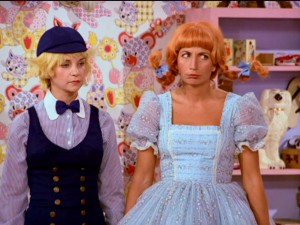
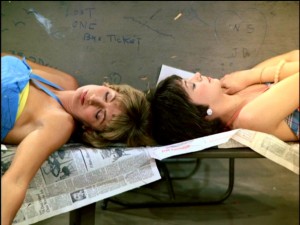
VIDEO and AUDIO
While "Happy Days" is the more famous of the two, "Laverne & Shirley" appears to have been treated to better transfers than its originator.
The episodes in general appear quite clean with only minimal speckles appearing occasionally. Colors are often strong and vivid, and while some shots are soft, the transfers in general are fairly crisp. If any complaints are to be found, they'd lie with the transitional shots. Usually when a shot fades or splices into the next scene, its colors are dark and murky with more noticeable print flaws. Considering how presentable other shots are, it seems the quality of the transitional ones is unavoidable lest Paramount partook in an extensive restoration. Otherwise, the season as a whole looks quite solid.
The back of the packaging states that the Dolby Digital mono tracks have been restored. While it's unclear how much restoration went into them, they do come across fairly cleanly. Dialogue varied but was usually pretty intelligible. Music (outside of what may be DVD replacement cues) actually sounds quite sharp and is the best thing about the tracks. No one will mistake this for great audio, but it's decent, nonetheless.

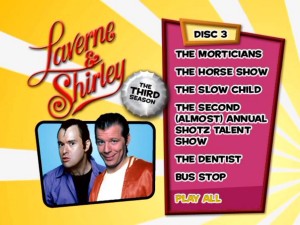
BONUS FEATURES, MENUS, PACKAGING and DESIGN
In an unsurprising move, "Laverne & Shirley" contains no supplements at all. It still manages to disappoint, regardless. Considering most of the cast is still alive, it seems a wasted opportunity not to have them provide sound bites for featurettes or commentary tracks. Penny Marshall supposedly doesn't enjoy reminiscing about the show,
so it's unclear as to whether she or Cindy Williams would want to participate. Even with that mind, Michael McKean, David L. Lander, and Eddie Mekka could offer interesting stories, and one finds it hard to believe that no one filmed any behind the scenes footage on the set.
Each disc features a single static menu listing the episodes featured. There are no set up options, animation, or music to be found. Disc 1 starts off with a preview for other Paramount sitcoms, the only thing on this set outside of the series itself. Each episode of the show (except, strangely, "The Slow Child") contains five chapter stops.
As with other Paramount sitcoms, this set comes in a clear double Amaray case. The tray inside holds a disc on either side while the interiors of the case itself also hold discs. The interior of the cover artwork lists episode summaries along with original airdates.
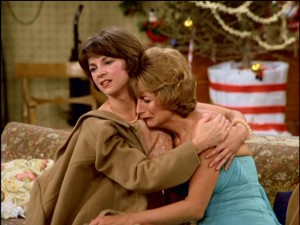
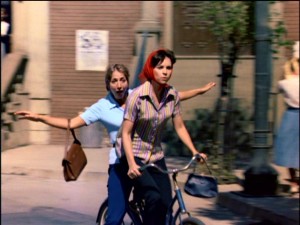
CLOSING THOUGHTS
"Laverne & Shirley" may have a broader and showier sense of humor than "Happy Days," but its good-natured tone coupled with memorable performances help make the show fun and breezy. Video and audio on this Third Season DVD are both above average, but the lack of supplements is aggravating for a show this well-known. The edits and music replacements, as brief and subtle as they may be, also make the high price look ridiculous. This set is recommended to diehard fans of the series. For those who only casually enjoy it or want to experience it for the first time, a rental is perhaps better suited.
More on the DVD / Buy from Amazon.com